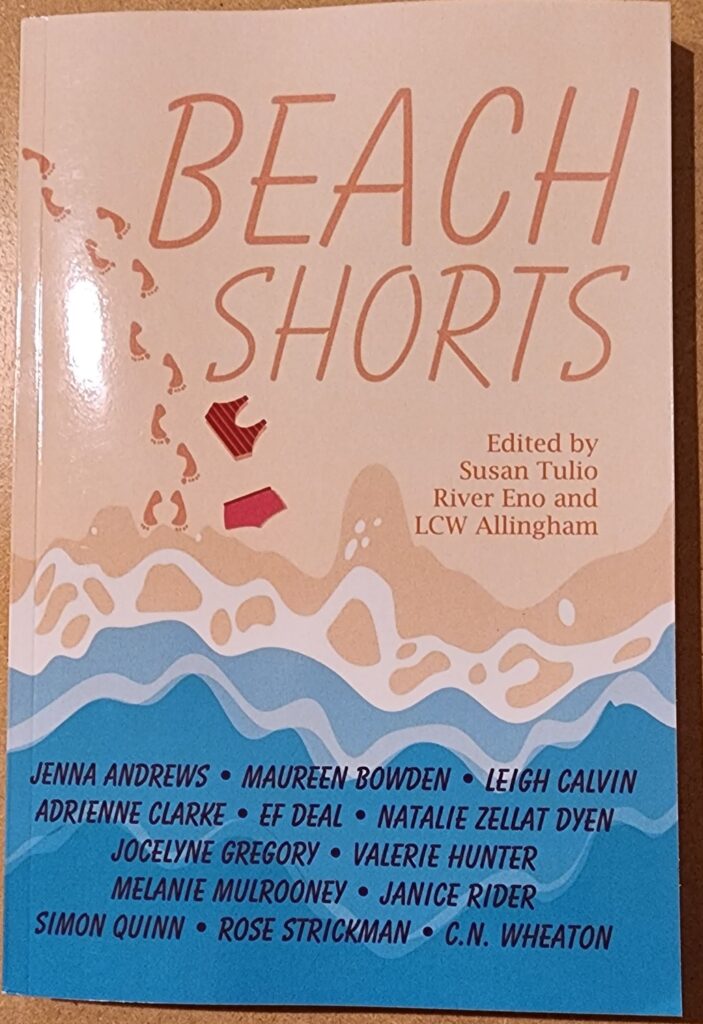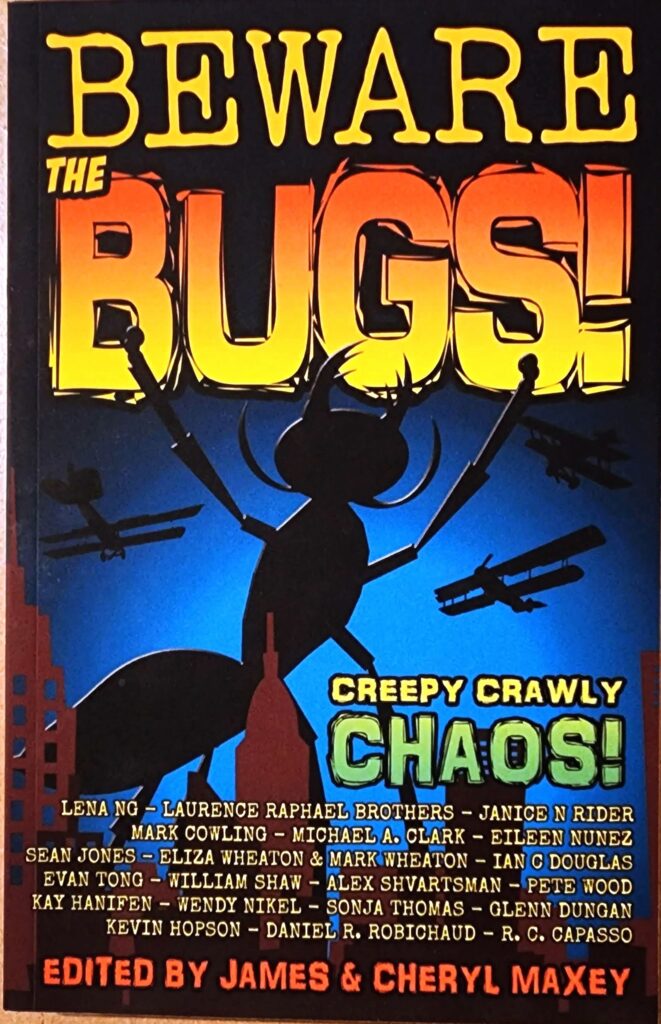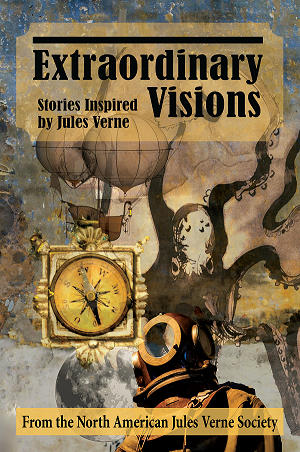If you love animals and the quiet contemplation of nature, the author I interview today will appeal to you. Janice Rider wrote the story “Want of Air” for Extraordinary Visions: Stories Inspired by Jules Verne.
Janice Rider (she/her) has always loved the natural world and resides in Calgary, Alberta, Canada, close to the Rocky Mountains. She has a BSc in Zoology with a minor in English Literature and a BEd degree. Springs and summers following university course work were spent at the Calgary Zoo where she helped look after many different animals. A trip to Africa was a highlight for Janice; there, she was able to observe wild animals hunt and play. Janice directs The Chameleon Drama Club for children and youth. Three of her plays for youth were published through Eldridge Plays and Musicals. As well, a nonfiction piece of hers on snakes was published in Honeyguide Literary Magazine. Three of Janice’s short stories are published in anthologies – Beware the Bugs! by Word Balloon Books; the North American Jules Verne Society’s Extraordinary Visions; and Speculation Publications’ Beach Shorts. Currently, Janice is involved in a two-year international mindfulness meditation program for teachers. She sees mindfulness as a way of coming into harmony with the natural world.
Let’s get to the interview:
Poseidon’s Scribe: How did you get started writing? What prompted you?
Janice Rider: I started writing when I was about fourteen years old. I loved to read and writing seemed a natural outlet for my love of words. As well, my dad liked to journal and wrote poetry and short stories for fun. He and my mom encouraged my interest in writing. When I was in grade eight, I received the gift of Tolkien’s Lord of the Rings for my creative writing, which was an added incentive to keep doing what I loved.
P.S.: Who are some of your influences? What are a few of your favorite books?
J.R.: I have enjoyed so many different authors, but when I was in elementary school any books to do with horses interested me, books like Anna Sewell’s Black Beauty and Glenn Balch’s Tiger Roan. As well, I appreciated the playfulness of Lewis Carroll’s Alice in Wonderland, as well as A. A. Milne’s Winnie the Pooh. In my teens I particularly loved the books written by Charles Dickens, Richard Adams’ Watership Down, Jane Austen’s novels and Robert Louis Stevenson’s Treasure Island.
Currently, some of my favorite books are TJ Klune’s Under the Whispering Door, Thomas King’s short stories, Alexander McCall Smith’s The Number One Ladies’ Detective Agency series, Neil Gaiman’s short stories, Neil Gaiman and Terry Pratchett’s Good Omens, Kate Quinn’s The Rose Code and Silvia Moreno-Garcia’s The Daughter of Doctor Moreau. One book I found horrifying but utterly impossible to put down was Grady Hendrix’s The Southern Book Club’s Guide to Slaying Vampires. I like novelty in short stories and novels and admire authors whose characters are unexpected. When reading I also look for the ability of an author to touch the heart and bring compassionate characters to life without slipping into sentimentality. Clever humor is always welcome.
P.S.: How do animals figure into the stories you write?
J.R.: My stories almost always relate to the natural world and animals in some way or other. My background is in zoology, conservation and education, so I have a strong desire to pass on my fascination with the living world around us. Animals may be central to a story’s outcome, as in a story I am working on about a young girl and her sister who learn that bulls can be dangerous. They may be part of a human character’s make-up, as in a short story I’m hoping to get published about Medusa. In some cases, the animals in my stories form close bonds with humans, even if they are creatures like hornets as is the case in another story I’m in the process of writing.
P.S.: What are the easiest and most difficult aspects of writing for you?
J.R.: That’s a tricky question. Sometimes, my stories seem to write themselves; at other times, I have to keep revisiting them while working on other things. I feel that the best way to progress is to make time for writing on a regular basis, which can be challenging for me as I am juggling a number of interests in my life. When stuck, I will turn to a few pages of a well-loved author just for inspiration. I also notice that, for me, it is easy to begin a story, and I have lots of ideas; however, unraveling the ideas into full stories is a process and often requires rewriting.
P.S.: Your short story, “Shark Out of Water,” appears in the anthology Beach Shorts. Tell us about that story.
“Shark Out of Water” was originally written for the drama club I direct for children and youth. The young people involved in the production had such a lot of fun with it! When Speculation Publications advertised for submissions on the theme of romance reading for the beach, it seemed like a great fit. The story is based on the Hawaiian myth, “The King of Sharks.” A young woman, Fabia, becomes smitten with a new face on the beach. This man is so very different from anyone she has ever known, but is he all he seems or will he take an unexpected bite out of her life? You’ll have to read the story to find out!
P.S.: I understand that you’ve been practicing Spring Forest Qigong for over a decade. What is that, and how has it helped you?
J.R.: Spring Forest Qigong, like Tai Chi, is one form of qigong. There are literally thousands of different forms of qigong practice. Qigong can be practiced as a martial art form, as an academic discipline, or as a way of maintaining or improving health. Spring Forest Qigong is aimed at bettering health. I find it meditative and calming. I have been leading this practice for a long time and feel that it helps me to be more focused and centered.
P.S.: The anthology Beware the Bugs! includes your story “Marvin’s Millipede.” What is the problem or conflict to be faced by the protagonist of this tale?
J.R.: Oh, I had such a lot of fun writing this story! It just flowed and gave me such pleasure! The story is about a boy, Marvin, who has a love of arthropods – the creatures with jointed legs, segmented bodies, and an exoskeleton. His favorite arthropod is the millipede, you know, the critter with the multitude of legs for walking on, the one you see cartoon pictures of with piles of shoes on its many feet. When he and his two friends, Lucy and Sophia, find an American giant millipede a little over three inches long, they decide to conduct an experiment to see if they can make the millipede, dubbed Maverick Miles Maddox or MMM, bigger. Does their experiment work? Yes, it does! MMM becomes very large indeed, gigantic in fact! Marvin and his friends must now decide what to do about MMM.
P.S.: You’ve written three plays that were published. Each appears to take inspiration from earlier works, but gives these works a twist. Please tell us a little about all three and tell us the twist in one of them.
J.R.: I’ve written far more plays than I’ve published, and it was satisfying to have a few published.
“Aladdin and His Sister,” is about a spoiled Aladdin who is fortunate enough to have a resourceful, courageous, and compassionate sister, Maliha, to help him manage his affairs. Two genies feature in the play.
“Cyrano and Roxanne” is based on Edmond Rostand’s play, “Cyrano de Bergerac.” In my take on the story, I provide Roxanne with three bosom friends, Chrystele, Danielle and Brigitte, who help to see that this time round there will be a happy ending for Cyrano and the woman he loves.
“When Science Bites Back” is really two plays that are part of one production. Both plays are science fiction, which is not an easy sell for the stage, and based on stories by H.G. Wells works with a touch of Alexandre Dumas’ novel, The Black Tulip, worked into the second story. In “Bacterial Broadside,” villains steal an experimental sample from the famous bacteriologist, Professor Parvulus. Will the world ever be the same again? In “Orchid Obsession,” rival botanists compete for first prize at the Exotic Blooms From Bulbs Competition. When one of the botanists receives a bulb under unusual circumstances, will the bulb bloom into something bloodthirsty?
P.S.: The Extraordinary Visions anthology includes “Want of Air,” a story of yours with no animals. What inspired you to write it?
J.R.: “Want of Air” does not have animals in it, but in the story, Jordan’s mother, Karen, is working to protect a marine offshore area, and his father was an oceanographer. Jordan is clearly fond of living creatures as his bedroom is hung with photographs and illustrations of numerous sea creatures.
The inspiration for the story was my oldest son, Nathan, who began reading a shortened version of Twenty Thousand Leagues Under the Seas in grade four. Like Jordan, he became so involved in the book that he was identifying with the characters and their distress. He became anxious about the amount of air in our home. It was a cold winter day, and Nathan wanted the window open. For the story, I imagined what might have happened had Nathan opened the window on that bitter day. Thankfully, Nathan still has his dad in his life as my husband is very much alive.
P.S.: What is your current work in progress?
J.R.: I am currently working on more than one story. One of them is a science fiction tale about an elderly patient who has a robotic lion to help him manage his senior years. The patient’s son has tampered with the inner workings of his robotic pet who begins to engage in decidedly realistic lion behavior. The story is inspired by my dad’s current struggles and my work at the Calgary Zoo with lions.
Poseidon’s Scribe: What is your advice for aspiring fiction writers?
Janice Rider: Enjoy the writing process, connect with other writers, and carve out time to write, preferably each day. If I am writing something, and it ceases to be enjoyable, I step into another story and come back to the one I am struggling with later. I have a friend, Heather MacIntosh, who has also published short stories. Talking together and sharing our thoughts and tales has really inspired me to keep writing. When I write regularly, I feel content at the end of the day. It seems to me that writing, like qigong, is therapeutic.
Poseidon’s Scribe: Thank you, Janice. It’s good that you enjoy writing. I fear if I wrote about snakes, millipedes, and sharks, I’d be creeped out, not calm.
Readers can find out more about Janice on LinkedIn.




